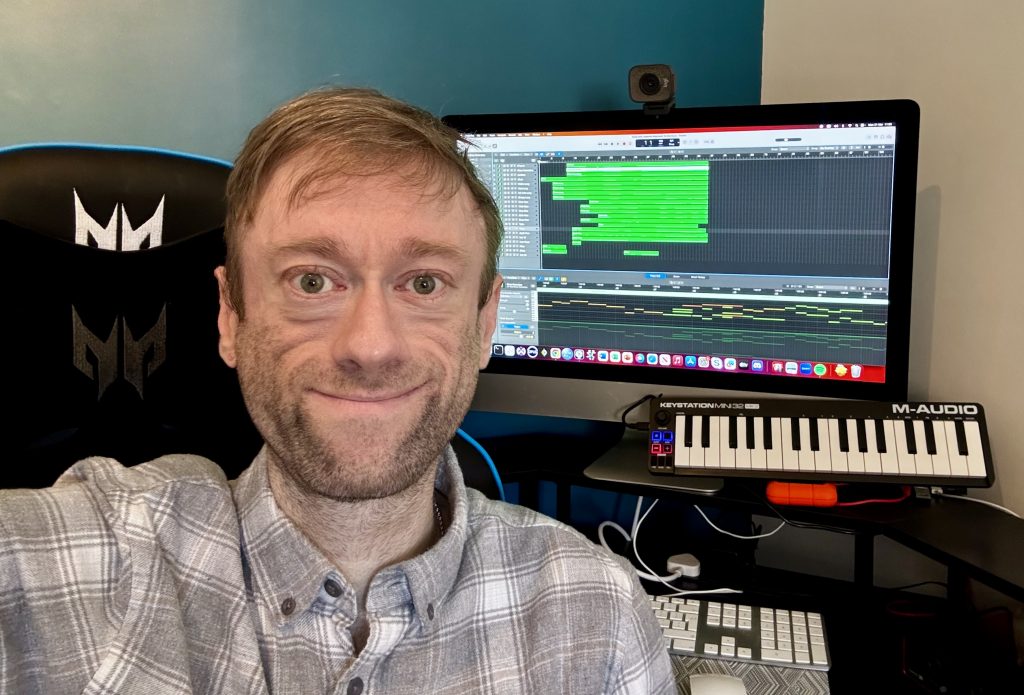Living with Multiple Ultra-Rare Diseases: A Journey of Resilience and Discovery
April 2025In this interview, led by Matt Bolz-Johnson, EURORDIS’ ATMP and Mental Health Advisor, Leon Hubbard shares his journey of living with three ultra-rare diseases, reflecting on decades of facing complex medical challenges.
Leon recounts the shock of being diagnosed in childhood with Juvenile Dermatomyositis, lipodystrophy, and pulmonary arterial hypertension, and the profound physical and emotional impact these conditions had. Despite a daunting prognosis, he defied medical expectations, driven by curiosity and a tireless search for answers.
His journey continues to evolve, from genetics research to inclusive music creation, all while holding onto hope for future breakthroughs in understanding his unique condition.

Leon Hubbard’s Testimony
Growing Up with Multiple Ultra-Rare Diseases
My life has been marked by extraordinary medical challenges. I was diagnosed with three ultra-rare diseases during childhood, and my journey has been filled with unexpected turns and a quest for answers that has spanned decades.
A Childhood of Diagnoses
At the age of seven, I was diagnosed with Juvenile Dermatomyositis, a rare autoimmune disease that destroys muscle tissue. I started tripping over more often. I remember seeing the school nurse quite a lot because I was tripping almost every day. This was followed by a diagnosis of lipodystrophy a year later, which destroys fat tissue. The most severe diagnosis came at age 15 when I was diagnosed with pulmonary arterial hypertension. Of all these diagnoses, this one was probably the most severe. It is high blood pressure within the pulmonary artery, which forces the heart to work much harder, leading to heart failure over a short time.
Defying Medical Expectations
Despite the grim prognoses associated with these conditions, my health has remained remarkably stable. The loss of muscle and fat is irreversible, but there have been no relapses across these conditions since childhood. I have lived with terminal prognoses for over half my life, and no one knows why. Now 37, I have surpassed medical expectations, living without medication for my pulmonary hypertension and maintaining stable liver function. Mentally it is a strange place to be – do you live your life expecting to die, or expecting to live? There is substantial uncertainty over what the future will hold, which resulted in anxiety, depression and insomnia. It has also been extremely isolating as no one will have heard of any of the rare diseases, and given the unusual clinical course, it is therefore challenging to describe it. Given the terminal prognoses have been wildly inaccurate, I no longer have confidence in medical opinion and clinicians were never interested in the unexplained disease course and lack of progression.
The Search for Answers
The ongoing uncertainty led me to pursue a career in genetics in search of answers. My academic background, from psychology to neuroscience to genetics, closely mirrors my personal journey. My professional work in psychiatric genetics also allowed me explore potential genetic factors for my unusual presentation. Knowledge is the only cure for uncertainty. The knowledge I gained during my time at Cardiff University directly resulted in the referral to the Syndrome without a Name (SWAN) Clinic, which specialises in identifying possible genetic contributions for ultra rare or undiagnosed genetic diseases. This will be the first time in three decades where I might actually get some answers. There are no guarantees, but this marks an emotionally significant moment in my life as it represents closure one way or another. I am truly lucky to have had the opportunity to be involved in cutting-edge science both professionally, and to see this used in clinical settings as a patient.
A New Direction
After years in academia, I am now focusing on something that doesn’t involve genetics! I have always loved music, but I cannot physically play an instrument. Using dedicated softwares, I can still create music and sampled instruments/synths on the computer. I have just launched a new business rwxMusic with the aim of promoting and teaching this way of making music, because it is fun and highly inclusive. This provides a different route for those with disabilities into the music creation and the arts. This new direction feels meaningful to me and I am excited to see where it leads.
Embracing uncertainty
I am optimistic that cutting edge science will eventually become mainstream in medicine, and those with undiagnosed or complex presentations will benefit due to shorter diagnostic odysseys in the future. However, uncertainty will always be there. In my experience, the psychological symptoms and their consequences can be worse than physical symptoms without the right treatment and support. While my medical journey has been complex and often challenging, it has also led me to discover new passions and ways to contribute to the world. As I await the results from the SWAN Clinic, I remain hopeful that my experiences might contribute to scientific understanding and potentially help others facing similar challenges. I have learned the importance of resilience, the power of pursuing answers and the importance of having an open mind.
Over the coming weeks and months, EURORDIS will continue publishing testimonies obtained from advocates living with a rare disease who have kindly shared with us their experiences of the impact of having a rare disease on mental wellbeing and their hopes for the future.
If you would be willing to share your own personal story as one of our testimony please contact Matt Bolz-Johnson, our Mental Health & Wellbeing Lead, at matt.johnson@eurordis.org.
Our last testimony was from Susana Carvajal, who shared her family’s journey with her son’s familial hypomagnesaemia.
Visit our Mental Health & Wellbeing webpage to read upcoming articles from our series of testimonies.
